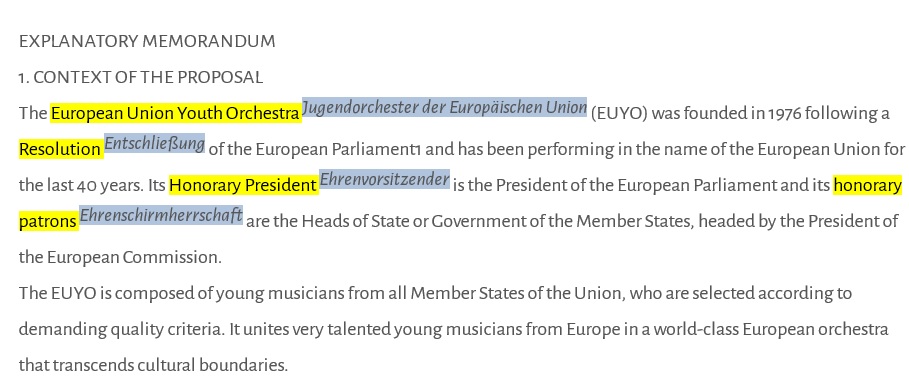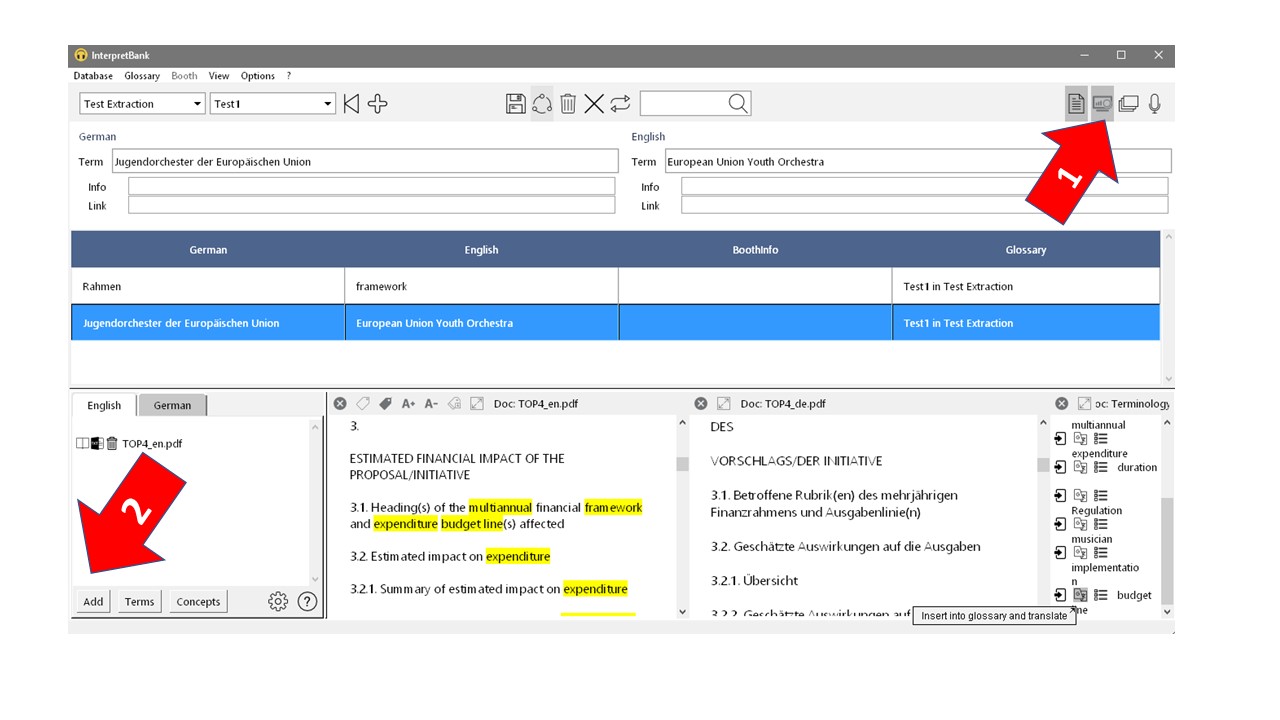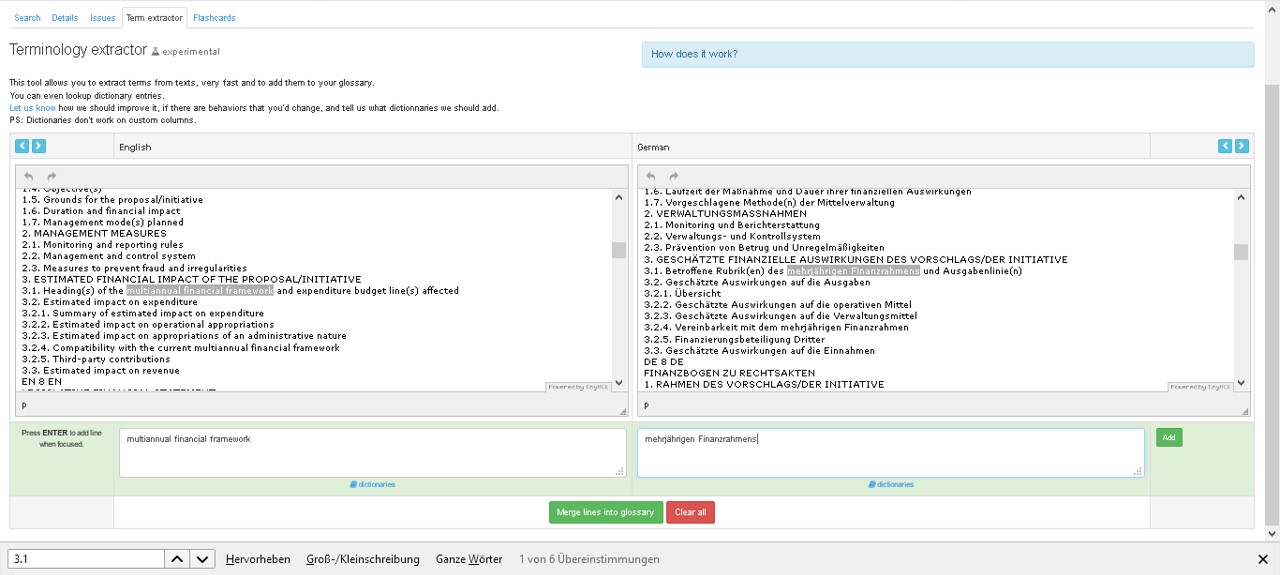Extracting terminology from preparatory texts into a term database seems to be the hot topic of the moment, judging by what the two most active and innovative CAI (computer-assisted interpreting) tools, InterpretBank and InterpretersHelp, are working on at the moment. So while I am still waiting to become a Windows beta tester of Intragloss, the pioneer in this field, I am eager to have a go at both InterpretBank5’s (beta) and InterpretBank’s (experimental) new extraction features.
InterpretBank by Claudio Fantinuoli has been adding quite some time-saving features for conference preparation lately. Apart from searching online ressources on the go while building your glossary, it now promises to extract terminology from your glossaries, view original and translation in parallel and link documents to glossaries. This does indeed sound like Intragloss combined with the sophisticated booth-friendly terminology management system that InterpretBank has been for many years. So off we go!
As you can see in the picture, a new “documents” icon has been added to the familiar three others (editing, conference mode, flashcards). When I press the magic button, the documents pane appears in the bottom left corner and lets me add documents like pdf or pptx in my two languages and display them next to each other. Unfortunately, there is no synchronised scrolling and no search function to look up word in the documents, but these functions are to be implemented soon. The selected documents are now linked to the glossary, so whenever this particular glossary is opened, they will appear in the documents pane. Highlighting words in the two texts and inserting them into the glossary or looking up translations in my favourite online resources (like IATE, Linguee, Pons, LEO and others more) works so swiftly, when I first tried it the terms were in my glossary before I had even noticed.
For English texts, context examples can be looked up using the right mouse button or using the icon in the list of extracted terms. And what’s great for sharing with colleagues and for using in the booth: The text can be opened in a separate window and annotated with records from the glossary:
Automatic extraction of terminology or key concepts so far only works for English, but will be implemented for other languages, too (German, Spanish, French and Italian are planned to be released in April). Quality of extraction, as always, depends on many factors, like the amount of text and the subject area, but it is good to get a first impression of the subject matter at hand.
InterpretBank as a locally installed application raises no confidentiality issues with your client’s documents being opened and processed, as everything InterpretBank does happens on your computer (unless you use the “send document to any device” option).
If you are more of a team glossary and online networking person, InterpretersHelp by Yann Plancqueel and Benoît Werner is the other option to manage glossaries and manually extract terminology from texts. It is quite straightforward: Adding documents works via Copy & Paste, you just paste the text into a field for the respective language so you have the two language versions displayed next to each other (but with no synchronised scrolling either). When I tried it, inserting 20 pages from a pdf worked fine. Words can be looked up in the texts using the browser search function.
The highlighting and inserting also works very swiftly and you can look up terms in Google Translate and the Oxford Dictionaries. Once you have extracted all the vocab you need, you press a button to add all the new entries to your glossary. When changing back from the glossary view to the extractor, the texts have disappeared.
InterpretersHelp as a cloud-based tool addresses the data protection issue by encrypting the data that transit to and from the website (https://interpretershelp.com/help/secure_hosting).
Of course there are zillions of other functions interpreters need for CAI tools to support their workflow perfectly. But I think that both InterpretBank and InterpretersHelp have added one super useful feature to make our lives easier. Thanks a lot!
About the author:
Anja Rütten is a freelance conference interpreter for German (A), Spanish (B), English (C) and French (C) based in Düsseldorf, Germany. She has specialised in knowledge management since the mid-1990s.
Further reading:
Summary Table of Terminology Tools for Interpreters. <www.termtools.dolmetscher-wissen-alles.de>
Josh Goldsmith: The Interpreter’s Toolkit: Interpreters’ Help – a one-stop shop in the making?. In: aiic.net February 12, 2018. <http://aiic.net/p/8499>.
Anja Rütten: InterpretBank 4 Review. 31 July 2017. <https://blog.sprachmanagement.net/interpretbank-4-review/>.
Alexander Drechsel: App profile: Interpreters’ Help. 2 Oct 2015. <https://www.adrechsel.de/dolmetschblog/interpretershelp>.
Anja Rütten: Booth-friendly terminology management revisited – two newcomers. 29 April 2014. <https://blog.sprachmanagement.net/booth-friendly-terminology-management-revisited-2-newcomers/>


Leave a Reply